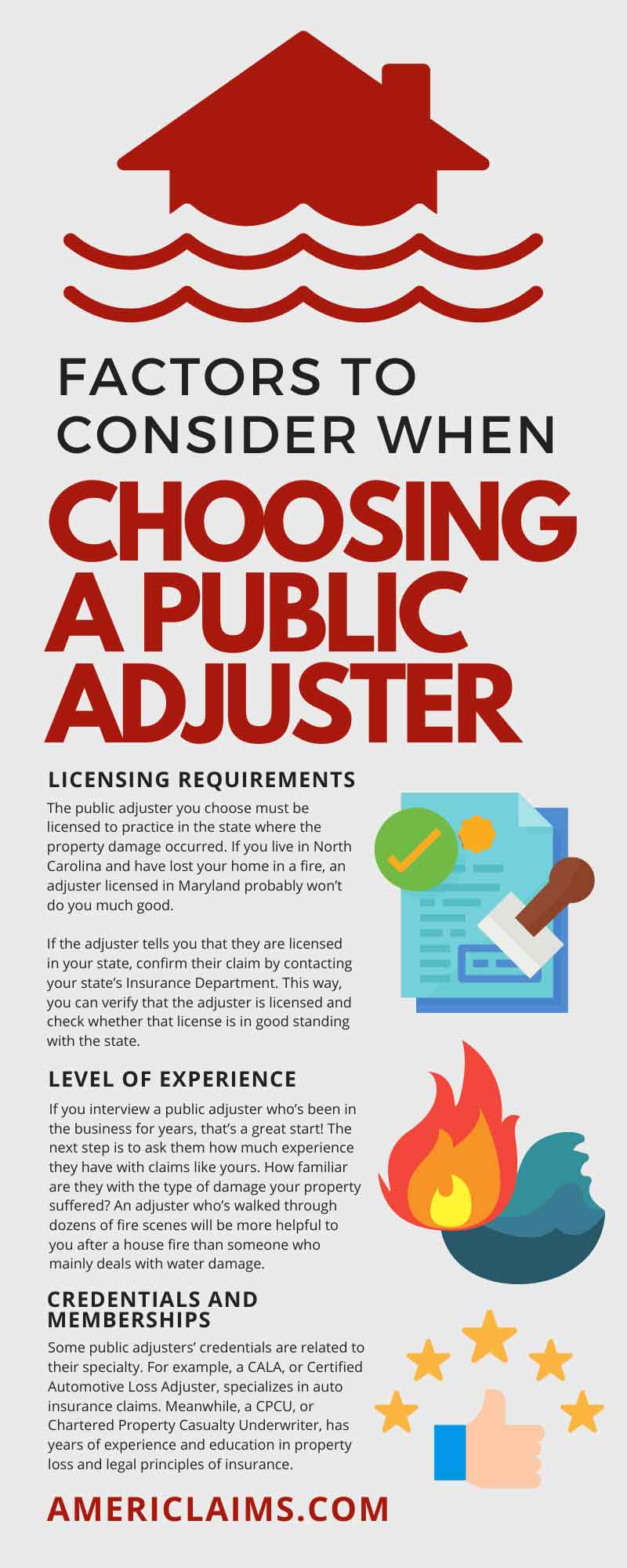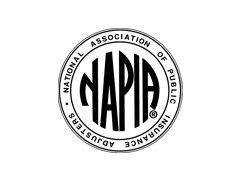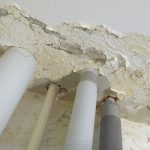Factors To Consider When Choosing a Public Adjuster
Your choice of public adjuster can make or break your insurance claim. Think of hiring an adjuster like investing in property or hiring a lawyer—your choice can have far-reaching effects, either positive or negative. Which factors should you consider when choosing a public adjuster?
Property damage claims can be difficult to navigate on your own, depending on the complexity of the case and the severity of the damage. An experienced public adjuster—like those at Americlaims—can expedite your claim and secure a settlement that is full and fair. As you interview different adjusters, keep these factors in mind and take care not to make any snap decisions.
Licensing Requirements
The public adjuster you choose must be licensed to practice in the state where the property damage occurred. If you live in North Carolina and have lost your home in a fire, an adjuster licensed in Maryland probably won’t do you much good.
If the adjuster tells you that they are licensed in your state, confirm their claim by contacting your state’s Insurance Department. This way, you can verify that the adjuster is licensed and check whether that license is in good standing with the state.
Level of Experience
While every public adjuster has to start their claims career somehow, many policyholders hesitate to work with an inexperienced adjuster. Depending on the severity of the damage to your property, you may do better to work with a more seasoned adjuster.
If you interview a public adjuster who’s been in the business for years, that’s a great start! The next step is to ask them how much experience they have with claims like yours. How familiar are they with the type of damage your property suffered? An adjuster who’s walked through dozens of fire scenes will be more helpful to you after a house fire than someone who mainly deals with water damage.
Pro Tip:
Some forms of property damage require specific add-ons to your insurance policy. If your home was devastated by a flood, you’ll need a public adjuster for flood insurance to help you read your policy closely. If you don’t have flood-specific insurance, your adjuster can research and offer alternate solutions.
Credentials and Memberships
Your public adjuster’s credentials don’t begin and end with their license. Do they have the appropriate certifications to work with adjusting software? Do they continue their education by completing specialized courses?
Some public adjusters’ credentials are related to their specialty. For example, a CALA, or Certified Automotive Loss Adjuster, specializes in auto insurance claims. Meanwhile, a CPCU, or Chartered Property Casualty Underwriter, has years of experience and education in property loss and legal principles of insurance.
Is your public adjuster a member of your state’s adjusters’ association? An adjuster with an association membership displays high levels of specialized knowledge and an eagerness to gain more education in their field.
Good To Know:
Other industry associations of note include the National Association of Public Insurance Adjusters (NAPIA) and United Policyholders of America (UPA). An adjuster who is active and connected in their industry has valuable knowledge that will be useful in handling your claim.
Questions To Ask a Potential Adjuster
As briefly mentioned before, hiring a public adjuster is a little bit like hiring an attorney. Your adjuster will represent your best interests during the claims process, and you’d do well to interview multiple adjusters before making your choice. Here are a few questions you can ask to gain more useful information as you weigh your options.
“Will you be handling my claim yourself?”
Some public adjusters work for larger firms and may outsource some parts of their job to other employees. Make sure you’re talking to the person who will ultimately be handling your claim so you get a good idea of how they operate.
“How many successful claims have you handled in my area?”
As a policyholder, you can get a decent idea of the future of your claim by asking about past claims the adjuster has handled. Don’t be afraid to ask for references from other satisfied policyholders! Think of this process like reading customer reviews before buying a product.
“How do your fees work?”
Public insurance adjusters generally work on a contingency basis, meaning they get paid a percentage of your settlement. Ask what that percentage will be up front, and make sure you won’t get any surprise bills during the claims process.
“Do you have insurance of your own?”
Reputable public adjusters generally carry their own errors and omissions (E&O) coverage in case there are any mistakes with your claim. Many of them also have a general liability insurance policy.
However, that doesn’t mean they expect anything to go wrong with your claim. A well-insured adjuster is prepared for every eventuality, which is a good sign for your own claim.
Red Flags To Watch Out For
Now that we’ve discussed plenty of positives to look for in a public adjuster, let’s take a closer look at some signs that an adjuster may not be reputable.
No Reviews or References
When you search for your public adjuster on the Internet, do you come up empty? When you ask your adjuster for references from satisfied policyholders, do they go silent? If you can’t find a single review or reference from a happy policyholder, there may be a reason for that. Shady or incompetent public adjusters don’t like to advertise their past poor performance.
Pressure To Decide
If you interview a public adjuster and feel like you’re being pressured by a sales pitch, stop and think before you hire them. Why are they being so aggressive? The adjuster may prioritize taking on as many claims—and collecting as many fees—as possible over doing a thorough job on each claim.
Enticing Promises and Guarantees
A competent public adjuster knows that the claims process can be complex and unpredictable. Adjusters worth their salt will avoid promising a positive outcome or guaranteeing a hefty settlement to policyholders. If you’re interviewing an adjuster who makes outlandish promises like these, politely thank them for their time, then move on.
As you choose a public adjuster to handle your insurance claim, consider these factors when you interview candidates and compare your options. Property damage claims can be complex and stressful, and you want a knowledgeable adjuster on your side to guide you through the process.
Keep a level head as you make your decision, and take care not to get drawn in by elaborate promises or sales pitches. It’s your property that’s been damaged, so advocate for its full restoration by hiring an adjuster you trust.









